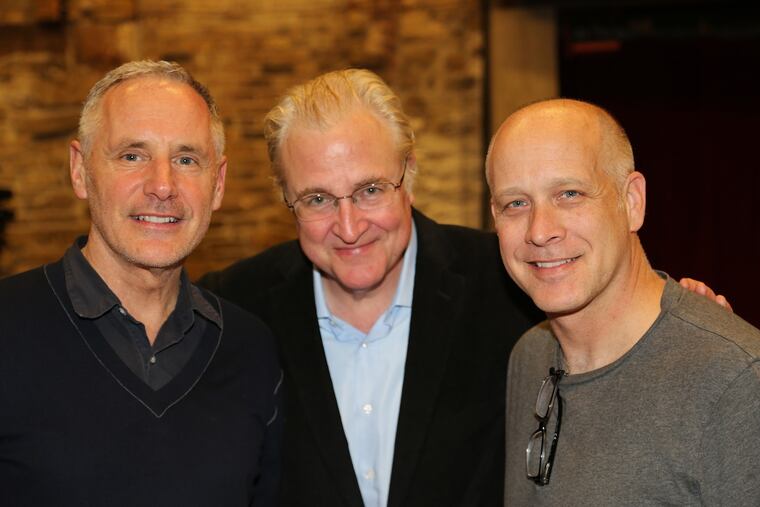An opera based on 'The Shining'? Yes - the book, not the movie
The inevitable moment of confrontation was upon them. How could any operatic adaptation of The Shining eradicate memories of those iconic Stanley Kubrick film moments when Jack Nicholson is breaking down the door to kill his terrified wife and psychic son?

NEW YORK - The inevitable moment of confrontation was upon them.
How could any operatic adaptation of The Shining eradicate memories of those iconic Stanley Kubrick film moments when Jack Nicholson is breaking down the door to kill his terrified wife and psychic son?
The question was posed somewhat pointedly on Tuesday at the National Opera America Center, when the Minnesota Opera presented a media preview of one of the most curiously awaited operas in years - The Shining - with premiere performances in Minneapolis on May 7 to 15.
The answer was simple: The opera is based not on the 1980 film, but on Stephen King's 1977 novel. Obviously, the story of a writer going crazy in a closed-for-the-winter resort has the kind of atmosphere and psychology for which opera was made. The hotel ghosts are perfect for creating grand opera choruses that, in more realistic circumstances, might seem theatrically illogical.
But the movie is a cultural artifact in ways the book is not. Some hipsters have the famously crazed Nicholson face - when breaking down the door and yelling, "Here's Johnny!" - permanently tattooed on their bodies.
"I can't get inside everybody's head and remove their images" of the film, said librettist Mark Campbell. "I'm not worried at this point. I'm really not. When I first signed on to the project, people made jokes like, 'I can't wait to hear what you do with "Here's Johnny." ' But that isn't in the novel so I don't have to worry."
Composer Paul Moravec has also studied the 1997 TV mini-series: "I know what's in them and now I'm adapting the book. It's not hard, because the story is so compelling. I have to work that way. That's how you write an opera. You go to source material. . . . I'm like a Stanislavski method actor. I pour my blood into these characters."
Undeniably, the opera team knows perceptions need to be addressed. In contrast to the seriously closed-door gestation of the Jennifer Higdon opera Cold Mountain (similarly based on a famous film and novel), the Minnesota Opera opened its workshops to the public - one reason the May performances are already 95 percent sold.
On Tuesday, pretty much everything was trotted out for the media: set and costume designs, scenes played with piano accompaniment with an emphatic message: This retelling of The Shining has more humanity than the film.
As it had to. Iconic moments from the film aren't welcome because they've lapsed into camp, says Campbell, and they cause listeners to step out of the story. Also, one legal restriction that came with the rights was that anything the movie added to the King story was off-limits - including the famous Nicholson line.
With new operas increasingly based on well-known film and literary properties, some projects start not with what strikes the fancy of composer and librettist, but what rights can be secured.
When the late composer Daniel Catán was after the opera rights to the film Il Postino, he discovered they were jointly owned by a large family whose individual members weren't speaking to one another. So he had to travel to Italy, going from household to household, requesting approval.
Often, rights come with bigger restrictions than those in The Shining. The Tennessee Williams estate wanted all words in André Previn's A Streetcar Named Desire to be taken in one form or another from the original play. What made The Shining easier than some was that King, who had libretto approval, gave Campbell's work the green light in only 24 hours.
The biggest difference between movie and opera is empathy. One of the opera scenes has the soon-to-go-insane Jack Torrance talking about what a failure he is, and how his family would be better off without him. Not that the opera is warm and fuzzy. "Once things start going to hell [in Act 2], there's no time for arias," Moravec says. "It rushes to its conclusion pretty quickly."
Living with The Shining was bound to be tough. For one thing, Moravec's wife, Wendy Lamb, shares her name with the opera's heroine, whom her husband is trying to kill. So she had to listen to Moravec in his studio singing through lines like, "Wendy . . . I'll bash your freakin' brains in."
Oddly, one of the least complicated assignments is playing crazy Jack. "I try not to plan too much. If you try to be too cerebral, it falls flat," says baritone Andrew Lovato, who sang the Jack Torrance role on Tuesday and will understudy the opera performances. "You can't play scary. It has to just well up inside of you."